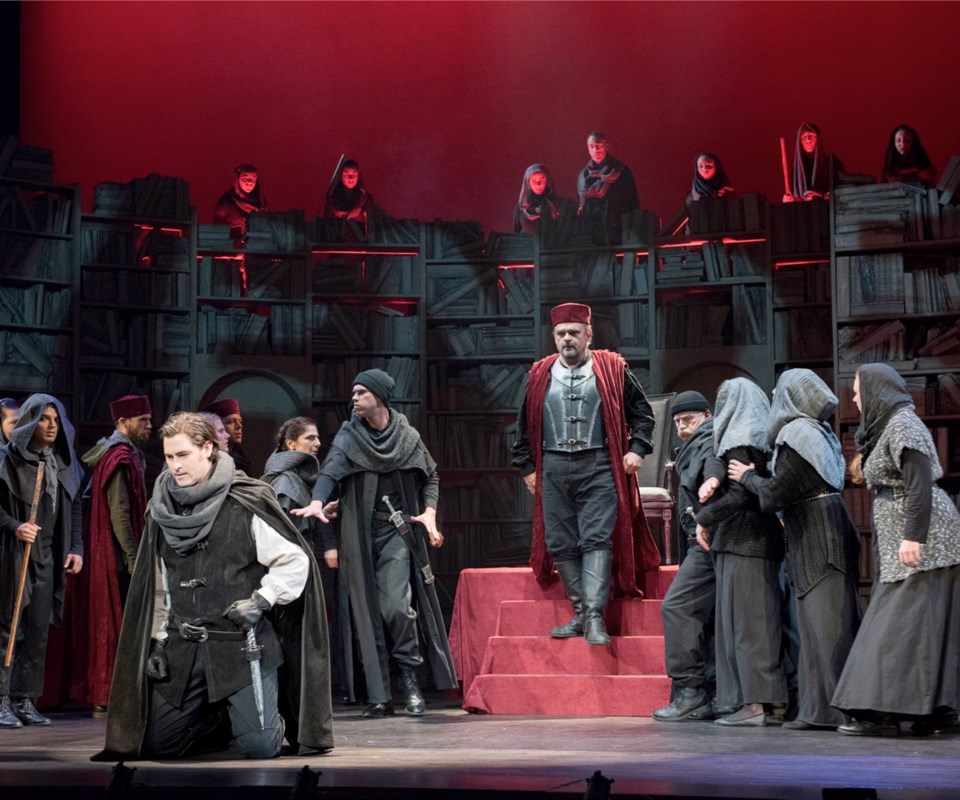Mention Verdi and most of us think of the big hits: Rigoletto, Il Trovatore and La Traviata.
His Simon Boccanegra is what’s known in pop music as a “deep cut.” It’s staged much less often, mostly because the plot is maze-like and at times clunky.
Yet it would be a mistake for opera-lovers to forgo Pacific Opera Victoria’s new production. This Simon Boccanegra is entertaining and cleverly staged. And it’s surprisingly moving.
Dispatched by the Victoria Symphony with vivacity and subtlety under Timothy Vernon’s baton, Verdi’s music is gorgeous. Sometimes the score is breezy or summery. More often it’s darkly burnished. Glynis Leyshon’s direction is sure-footed and grasps the essentials. And on Thursday night, there were consistently good performances from a talented cast able to act as well as sing.
What makes this production especially worthwhile is that it connects with us on a human level. There are a handful of truly affecting scenes. This is no small thing, given the story’s complexity and amped-up melodrama.
Simon Boccanegra is the story of a swashbuckling yet curiously moral pirate, Simon. Despite his initial protestations, he’s convinced by the people to become the doge (chief magistrate) of Genoa.
What follows is a dog’s breakfast of murders, betrayals, political intrigue, romance. One need not understand every little twist and turn to enjoy Simon Boccanegra. Here are a few key pointers.
We’re in 14th-century Genoa. When the opera begins, Simon’s girlfriend Maria has already died. Her father, Fiesco, hates Simon. We then jump ahead 25 years. Amelia, the now-grown-up daughter of Simon and Maria, is in love with Gabriele, an aristocrat who also considers Simon an enemy.
A courtier, Paolo, is enraged because Simon won’t let him marry Amelia. He poisons Simon (who takes at least 20 minutes to die) and is later executed.
At the end, Simon, Fiesco and Gabriele are reconciled. Gabriele’s going to marry Amelia and become doge of Genoa. Everyone’s kind of pleased, but it’s bittersweet because Simon has finally expired.
Todd Thomas is well-cast as Simon. Blessed with a handsome baritone voice, his low register is powerful, his high notes were dispatched with a thrilling heft.
And he’s an actor. Thomas’s best moments came during the council-chamber scene. Simon declares there is a traitor in their midst. With his face close to guilty party Paolo (skilled baritone Brett Polegato), Thomas conveyed a wide range of emotions — rage, disgust, despair — in a wonderfully ambiguous way.
When the crowd joyously declares Simon is elected doge mere minutes after he learns of his lover’s death, the new leader is hoisted onto a throne. It’s another beautifully staged moment also replete with ambiguity. With a light shining down onto his anguished face, we see Simon as a martyr in an almost Christ-like pose.
Simon spends much of the opera either dying or forgiving people. After swigging poison, he seems to take forever to expire.
“Hold me to your heart as I die!” he finally exclaims. And somehow we believe it all. Thomas sidesteps a mine-field of preposterous plot twists to find the great humanity and dignity within Simon’s character.
On this night it was announced that bass Phillip Enns, playing Fiesco, had a throat infection. Surprisingly, Enns still sang well. Vocally there was a sense of restraint, particularly in the lower register. Yet Enns was anything but phoning it in — this was an example of a professional excelling in a difficult situation.
No one sang better than soprano Lara Ciekiewicz as ingenue Amelia. Her clarion voice, boasting an exciting edge, carried effortlessly through the Royal Theatre. Her timbre is attractive and powerful, well-suited for dramatic roles. As her lover Gabriele, tenor Jason Slayden also impressed, nicely conveying his character’s anguish — “I’m raving, I’m weeping” — when it seems Amelia is slipping from his grasp.
As Paolo, Polegato makes a wonderful, Iago-like baddie, moving like a snake when he tries to encourage Fiesco to kill Simon in his sleep.
Camelia Koo’s set and costumes, which have a vaguely period feel, emphasize the colours black and sepia. This gives the low-lit opera a rather drab aspect. Nonetheless, I think the set’s terrific — dominated by two massive curved walls that resemble book-stuffed library shelves.
Leyshon has added bold touches that work well. For instance, the opera starts with the “old” Simon writing out the prologue’s events with a quill as his scribbles are projected onto the walls. There are other projections too; the words “pace” (peace) “guerra” (war) and “viva il doge” which appear as huge graffiti-style letters.
achamberlain@timescolonist.com
What: Simon Boccanegra
Where: Royal Theatre
When: Continues tonight, Oct. 19, 21, 23
Rating: 4 1/2 (out of five)
